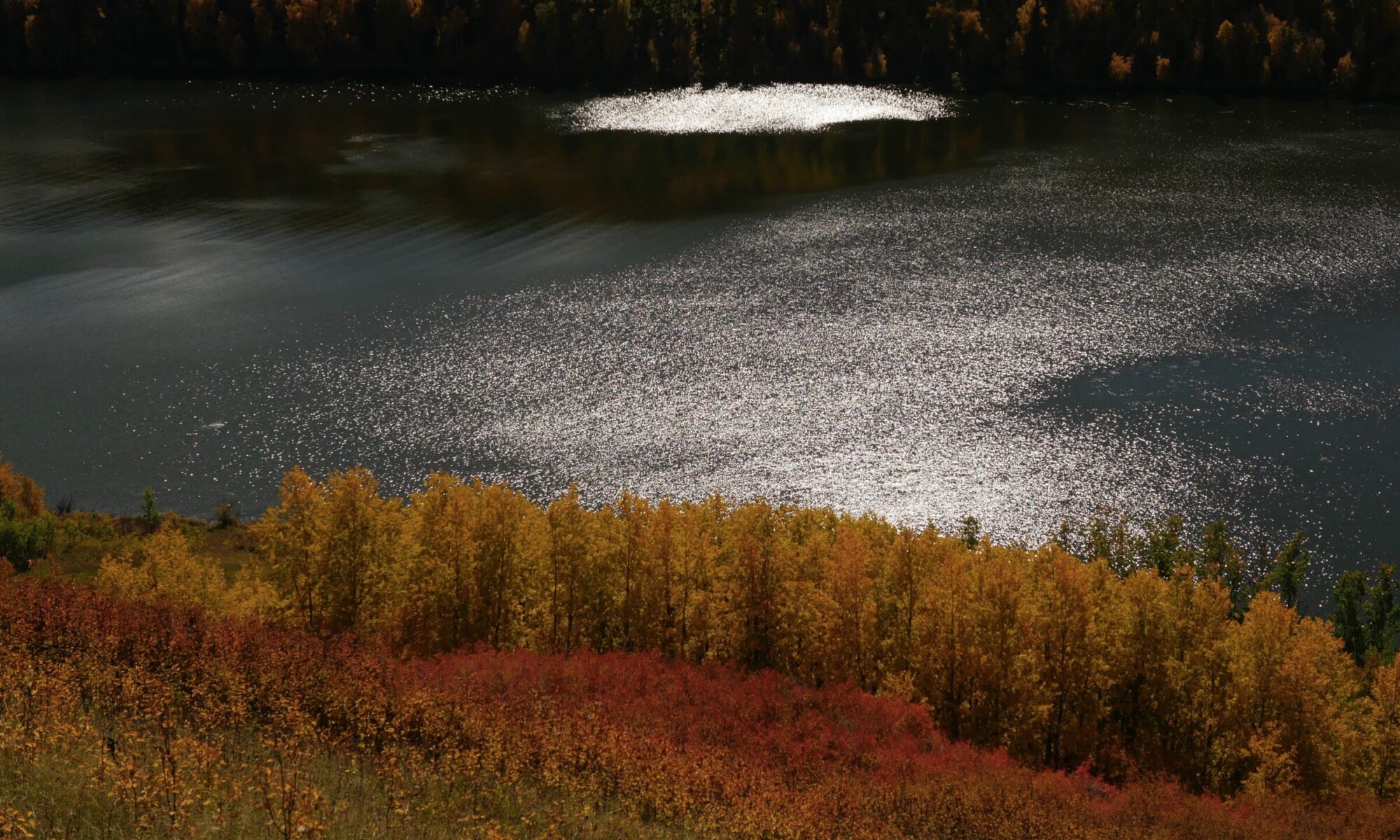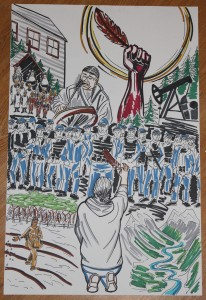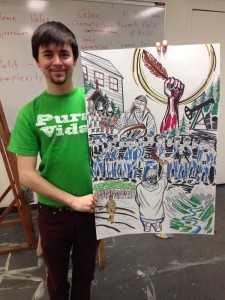Dealing with Climate Change: With Help from Princess Leia and Pogo
Without a doubt climate change is the most serious problem facing Earth and our species. In the past many environmentalists believed that if we gave people the facts they would “come around” and begin to take action. But we have been giving people the facts for at least two decades and there is little to show for it. Furthermore, educating the public about climate change often leads to a big downer.
Once people grasp the full implications of climate change, they also come to the conclusion that the problem is so massive that there is really nothing they can do about it. It is something “out there”, way beyond their control or ability to influence. The failure of governments and politicians that are supposed to be dealing with the major climate change issues at the national and international level only reinforces peoples’ sense of helplessness.
So what to do?
We can sit back and do nothing. We can fail to heed the warning of scientists that we are in the midst of a new age of Earth and our species. They call it the Anthropocene, literally the “new age made by man”. We are changing the climate of earth, poisoning the oceans, changing earth’s chemistry, widening the holes in the ozone layer, wiping out species at an alarming rate and engaging in a number of other disastrous steps that an increasing number of scientists believe will inevitably result in the Sixth Extinction.
Or, we can do something—but what?
We must deal with the underlying assumption that climate change is something which we have no power to deal with. Maybe it is not just something surrounding our planet. Maybe it is something within our communities, and even buried deep within our psyches. Maybe what is happening “out there” is a reflection and manifestation of what is happening “in here”, at home.
I’ve come around to thinking of climate change as a sort of a composite, global, holographic message to us earthlings. Think of Princess Leia’s hologram in Star Wars, and her plea. “Obi-Wan Kenobi: you’re my only hope.”
A hologram is a three dimensional image created by lasers. When you divide the image you don’t get a collection of parts. You get a smaller version of the same image with all the parts intact.
So…the reality of climate change that we see as being a global reality out beyond our control and influence is actually an enlarged composite of climate changing situations occurring all around the world at the local level. It is a manifestation of the relationships and interactions among governmental, economic, social, environmental and cultural factors coming together.
The current situation is serious. It is a though a war is going on. We have been destroying Earth and its life-support systems we depend upon for our existence. Now Earth seems to be fighting back against us, threatening our existence.
If the international community ever decides to get its act together it knows it can’t simply pass laws that everyone will agree too. It knows success will depend upon people taking action at the local level. But we can’t hang around waiting for the international community to act. If we are indeed on the slippery slope of the Anthropocene we must take action now at the local level. This requires two things.
First, we must help people reframe—get them thinking about climate change differently—as local issues and actions that also manifest globally. This different thinking begins with adopting Pogo’s observation made early in the environmental movement. “We have seen the enemy and he is us.”
Second, we must get much more politically involved. We must organize to hold our elected leaders at the local, federal and provincial level accountable for their own actions and for the actions of their corporate partners whom they are supposed to monitor but often fail to do so.
Given the seriousness of the climate change reality, these two actions, to quote Princess Leia’s plea to Obi-Wan Kenobe, seem to be our only real hope.
Mike Bell
Comox B.C.
Lorne Green – November 28th
Lorne Green shared the difficult history of residential schools with our class. Part of connecting with the land is healing the wounds colonialism has inflicted on us all. This is an important step forward for all of us, and will open us to right relationship with each other and with the land.
Peter LeBlanc also led us in a contemplative exercise on discernment.
Leah Johnson – November 21st
Leah shared her experience at a permaculture program in Cuba. In Cuba, a land of merely adequate resources, everything is put to use in creating spaces of low-input agriculture. Economic expenditure of energy of the system – including human energy – is at the center of this intelligent design.
Also, Nola Sharp joined us to lead us in our contemplative practice. I first met Nola in a narrative therapy workshop and the thought of how we story our lives has played in my daily questions ever since.
Roy Louis – November 7th
Roy Louis and his wife Judy connected our class with the history of the Cree people of this land. Roy and Judy are collectors of artifacts and stories, and they connected us with the storied land. History has a different feel when it’s being told about uncles and cousins. These are the tales of the treaty makers.
Community Correspondence – Vivienne’s list of great reads!
what a fabulous and inspiring program this is! here are suggestions of some books you might also find of interest. there are so many excellent books out there. these are just the ones that come to mind at the moment:
Wild Earth, Wild Soul: A Manual for Ecstatic Culture – Bill Pfeiffer
Active Hope – Joanna Macy’s most recent book with Chris Johnstone
Going Dark – Guy McPherson
Conscious Collapse – Carolyn Baker
The Derrick Jensen Reader: Writings On Environmental Revolution – Derrick Jensen
or anything else by Derrick Jensen
The Practice of The Wild – Gary Snyder
Ecopsychology: Restoring the Earth and Mind – edited by Theodore Roszak
Deep Ecology – edited by Bill Devall and George Sessions
Ecofeminism – Maria Mies, Vandana Shiva
The Ecology of Wisdom: Writings by Arne Naess
Woman and Nature – Susan Griffin
Spirituality for America: Earth-Saving Wisdom From the Indigenous – Ed McGaa
keep on rocking the world,
vivienne
A Difficult Post – Residential schools – Lorne Green
This is a rather difficult post to write…I am sitting here in class, listening to Lorne Green speaking about the history of residential schools, the effects and healing.
This semester I have been involved with different classes doing some work around residential schools which has been very impactful to say the least.
I saw first hand what kind of impact these systems and school had on people. My father and his younger brother were put in foster care and then in a catholic orphanage when they were young. The experience and its effects stayed with them through their lives. They each spoke a bit about it, even on their death beds. My dad and I were very close and spoke about many different subjects quite openly. When the horrors of residential schools began to be exposed more and broadcast my dad and I had several discussions about it. I did come out and ask him if anything had ever happened to him while in an orphanage and all he replied was that: “There are a lot of weird people in the world and a lot of sick people. Really sick people”. He also told me he saw a lot of severe beatings of kids, some where he knew they would never be the same. When I asked about sexual abuse he told me they stayed away from him for some reason. For a person that was always positive, optimistic and full of life and energy, this was one of the rare occasions where I saw my dad slide into a dark place with a different look on his face.
My mother and father very rarely disagreed on anything, however, I do remember one of the fights they had was about my mother wanted to take my sister and I to church or at least to Sunday school. My father absolutely refused. Its was one of the only times I saw him raise his voice and I knew there was no way to sway him. Even my mother crying didn’t help the situation. He said that there was goingto be no discussion about it, that when us kids were old enough that we could make our own decision about whether or not we would attend. I never really understood until experiencing and learning about the effects of trauma and grief later on in life. Funnily enough, towards the end of his life, my father asked to meet with one of the catholic priests in our city. They had several visits and I saw the effect that these meetings had on his sense of peace and well-being at the end of the terminal illness he died from.
I grew up in the Northwest Territories. Apparently between the NWT and Nunavut there were a total of 10 residential schools. The first were in Fort Resolution located on the South side of Great Slave Lake in 1867 and in Fort Providence on the shores of the Mackenzie River also in 1867. I still have friends residing in both these places. When I was growing up Fort Res was home to several dog mushers and kennels who did very well on the race circuit. My dad spent several weeks a year in Fort Providence hauling supplies over the river during break up and freeze up with a helicopter. It’s only been in the last few years that a bridge has replaced the ice bridge that we would travel on. When the bridge was out during these times there was no other way to cross the mighty Mackenzie.
Growing up, I heard stories about abuse that had gone on in these schools. Many different stories. I remember my friend’s mother telling me that when she was a young woman in her home community that she refused to go to church until they got this “half daft, sicko priest out of there” and she told us a story that is to obscene to repeat here. Coincidently, that same man many years later was brought before the courts for things he did to children in his care and in his community. She told me and her daughter to be very leery all the time and not to trust a soul.
Other stories included explaining the reasons as to why adults I knew around me drank or acted wild and abusive and crazy. As a kid, I didn’t really understand that it had a lot to with being taken away from their families and put into residential schools…in looking back now and knowing what I know about severe trauma and grief…it did. The witnessing of ongoing shame and trauma, blame and neglect. Struggle with severe addiction and different forms of abuse and just general insanity and the normalcy of it all is something which has permeated my life and beliefs and has taken a great deal of thought to somewhat sort out.
I look at my own two children and I think of them being taken from me, abused and neglected and I have no idea as to how a family ever would recover from that. My first instinct is always to think of my children’s wellbeing. That is very strong within me and I put it out there that it is very strong within every parent. To have your child taken from your care and subsequently abused is unimaginable. Like really sit and think about that for a moment. Think about what went on. The effects of these schools and this system had will be apparent for generations to come.
I believe that more healing will come from others speaking out more about the effects that these systems had on individuals and families. I am also going to propose that the current system continues on with these abuses today. That the abomination of indigenous and aboriginal individuals, families and communities in this country is blatantly continuing on today. One example that I put forth is the abuse and poisoning of one of the largest fresh water systems in the world, the Athabasca. Aboriginal communities along this river system are essentially being poisoned. There are children who are sick. Imagine being a parent of a sick child. A child you know is not going to get better. This is going on in this country today. There are still children being taken from their families by our government in this country. I encourage you to really sit and think about that. Has our society evolved at all? From residential school abuses to environmental abuses…Is this at all acceptable for any reason? It’s not to me.
Community
“Community [is] a group of individuals who have learned how to communicate honestly with each other, whose relationships go deeper than their masks of composure, and who have developed some significant commitment to “rejoice together, mourn together,” and to “delight in each other, make others’ conditions our own.””
M. SCOTT PECK, The Different Drum
I originally read this quote in “All About Love” by bell hooks, which I would encourage each and every one of you to read. Last night particularly was one of those times, listening to people’s final projects and sharing pieces of themselves and their journey through the semester. Again, thank-you to each and every person in the class, for creating a space where the ‘masks of composure’ can be shed, while simultaneously celebrating a great semester of spiritual growth and work. I know for my particular talk, that vulnerability wouldn’t have been possible in just any old audience. Thank-you for allowing a space where that was possible.
<3
The Choice is Ours to Make
“And he watches Lightning, whom he does not love. That one, he thinks, will be hard put to be worth what he will eat. For he is one who believes in a way out. As long as he as two choices, or thinks he has, he will never do his best or think of the possibility of the best”
–Wendell Berry: Bringing it to the Table, 217
Perhaps many of us can relate to Berry’s story, having had to put up with a character who does not know the meaning of hard work, maybe whose apathy gets in the way of their engagement, or someone whose blatant ignorance is frustrating beyond belief. I too feel this lack of love for individuals such as these. It’s a common malaise of our postmodern times, the malaise of choice. We can be engaged in as much as, or as little as we please, for our own accountability is rarely held to anyone other than ourselves. We do not have to follow politics if we do not wish, or divest from our consumer lifestyles, even get out of bed in the morning.
Fundamentally though, I would argue our choices have consequences, and in paying attention to the value of our choices, the potential of our actions, and strength with which we may proceed, the opportunities that ensue our engagement extend beyond our imaginations. Beginning with our plates: we may choose to eat responsibility to better care for the land that sustains us, the farmers who provide that sustenance, and to show respect for an omnivorous nature that imposes incredible strains on the natural environment. 3 times a day, maybe more, we may vote with our fork to make meaningful change to the food system, in particular. Our acts of consumption are not dissociated from politics, and Berry reminds us that it is in the conscious consumers hands to enact positive change on a personal, and systemic level.
We must then be conscious of choice, and the implications of our choices. For those who are unaware, or disengaged from these consequences, utmost love and nurturance is due. We must be careful to not condemn them for their ignorance, but instead lead by example and demonstrate the bounty and wholeness that accompanies our decisions to have concern for the environment, the welfare of people, and health of our bodies. Let us embark on this journey together, one meal at a time.
A documentary-videogame from NFB: “Fort McMoney”
This documentary/game is very much worth looking at (and playing): a new National Film Board release by filmmaker David Dufresne. Click here for the link to the main page, trailer and game. Click here for the filmmaker’s blog post about the game. The game has been getting quite a bit of press since its release this week.


